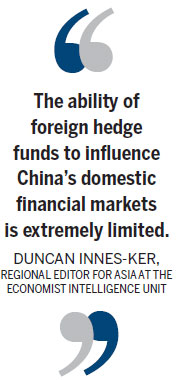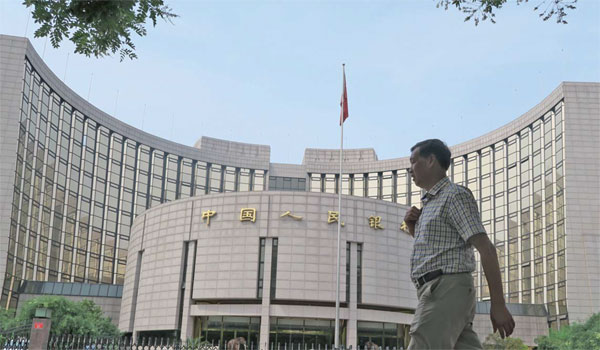Foreign bears don't affect China - yet
Updated: 2015-09-05 07:46
By Cecily Liu(China Daily Europe)
|
|||||||||||
International investors cash in bearish Chinese bets with little impact, but that may change
Some international investors have cashed in their bearish bets on the Chinese financial market in recent weeks, but the country's stringent capital controls mean the impact of their activities on China's real economy is still minimal, experts say.
On the whole, both China's financial markets and real economy are relatively protected from external speculative transactions, they say, although the degree of protection will inevitably decline as China further liberalizes its financial markets.
|
People's Bank of China, the country's central bank. The degree of protection on China's financial markets and real economy will inevitably decline as the nation further liberalizes its financial markets, experts say. Provided to China Daily |
In August, Emerging Sovereign Group's Nexus Fund made headlines by raking in $100 million in two days by anticipating a large depreciation of the renminbi - a 75 percent return for the fund.
This bet has attracted widespread attention because it is one of the few cases where foreign investors have been able to cash in on their bearish China bets. Despite China becoming an increasingly popular target for short bets, the country's strict foreign access to equity and bond markets means it is hard to bet on outright declines in those markets.
But the ESG hedge fund focused instead on betting against China's currency by purchasing put options that gave it the right to sell the currency at certain prices, hence it profited from the renminbi's depreciation.
"Despite the big gains made by the ESG hedge fund and potentially some other foreign investors, these transactions will have a very small impact on China's economy because the types of bets that can be placed are essentially very limited," says Miranda Carr, head of China thematic research at Espirito Santo Investment Bank.
More specifically, because of China's relatively closed capital account, the impact of foreign investors such as ESG on mainland currency markets is small, she says.
This protects China's currency market from big shocks that speculative currency trading could potentially have, as is demonstrated by classic examples such as the pound exiting the EU's Exchange Rate Mechanism in 1992 and the one-off revaluation of the Swiss franc against the euro this year.
In both situations, large volumes of trading by hedge funds contributed to the currency exchange shifts, either making or losing significant amounts of money for themselves in the process.
In the case of the pound exiting the ERM, George Soros, the most high-profile of the currency market speculators, made over 1 billion pounds ($1.53 billion) in profit by short selling the currency. The exit came about as the British government was unable to keep it above its agreed lower limit in the ERM. The event was dubbed Black Wednesday.
In January, the Swiss franc very quickly rose by some 30 percent against the euro after the central bank shocked global markets by abandoning its long-standing cap against the euro. Many hedge funds betting on the franc's depreciation lost massive amounts.
Everest Capital Global fund, an $830 million hedge fund, was forced to close after betting on depreciation of the Swiss franc. The fund is believed to have lost nearly a $1 billion in Swiss francs.

In this context, the $100 million made by the ESG fund is much less significant in scale.
Carr says hedge funds can often lead this type of market shift because their investment is likely to involve large volume trades resulting from their highly leveraged positions. In addition, their short-term trading horizon means they are more certain to invest in market disequilibria that are likely to readjust themselves quickly, unlike other funds that invest for the long term, like pension funds.
Many economists share Carr's views.
"The ability of foreign hedge funds to influence China's domestic financial markets is extremely limited. The amount of money that foreigners are able to invest in China's stock markets pales in comparison to the amount invested by domestic players," says Duncan Innes-Ker, regional editor for Asia at the Economist Intelligence Unit.
Andrew Lee, deputy head of ultra-high net worth and alternatives in UBS Wealth Management's Chief Investment Office, says the hedge funds that benefited from their bearish bets on the yuan's depreciation are not representative of the industry as a whole.
"Although a number of funds did benefit from the People's Bank of China's decision to widen the exchange rate band and the subsequent renminbi devaluation, this is not a consensus view and hedge fund positioning in the renminbi is not universally bearish.
"Furthermore, there is minimal direct linkage between bearish currency bets by global investors and the performance of Chinese financial markets," Lee says.
Mao Lei, an assistant professor of finance at Warwick Business School, says he believes the slowdown in China's real economy is worrying, therefore Chinese regulators should focus on growing the real economy and improving the efficacy of regulation rather than being concerned about international investors' activities.
Although the ESG hedge fund made money through the renminbi put options, there must be a counterparty to this trade who lost money, so the impact will not be on the Chinese economy, Mao says.
However, he says the hedge fund's ability to make such profits reflects a lack of transparency in the Chinese central bank's decision-making process that could reduce investor confidence, which is a wider problem.
Mao adds that China's financial market liberalization should be done gradually because there are still potential risks relating to freeing further capital flow, especially in relation to the banking system.
"The aggregate leverage of the economy is high, and our banking system is not transparent enough, and we do not know whether it can withstand large shocks in some key sectors, like the real estate market," Mao says.
The amounts that foreigners can invest in China's stock and equity markets are very limited. Only institutional investors are able to apply for a license to invest in China's onshore financial markets, and even then their investments are subject to a quota.
Typically they would make investments through mechanisms like the Qualified Foreign Institutional Investor scheme, and more recently, they can access China's stock market through the Shanghai-Hong Kong Stock Connect, which allows foreign investors in Hong Kong to buy a selected number of Chinese stocks.
Jonathan Bell, chief investment officer of Stanhope Capital, says while the impact hedge fund activities can have on China's equity and currency markets is now limited, it would increase as China liberalizes its market and reduces capital controls.
This would be considered a positive development for financial markets, because frequently the actions of hedge funds only bring prices to the levels they should be.
For example, in the situation of both the Swiss Franc revaluation and the pound being taken out of the Exchange Rate Mechanism, government policies were holding currencies at levels inconsistent with market demand and supply. Hedge funds and other speculators forced a correction that was required anyway, he says.
"Both the fall in China's stock market and the depreciation of the Chinese currency are driven by market forces. In the future the amount of overseas hedge funds betting on China's market could have a larger impact on its financial markets and economy, but it will be a necessary step in China's market liberalization process," Bell says.
cecily.liu@chinadaily.com.cn
(China Daily European Weekly 09/05/2015 page20)
Today's Top News
Drowned Syrian boys buried in home town
Britain to accept more Syrian refugees
US blogger: The parade shows President Xi is a true world class leader
China deserves more recognition for its contributions in WWII: scholar
Intl community echoes Xi's speech at V-Day commemoration
Sino-Russian investment fund eyes more deals
His name was Aylan, or humanity washed ashore: Opinion
Predicting Internet's future without a crystal ball
Hot Topics
Lunar probe , China growth forecasts, Emission rules get tougher, China seen through 'colored lens', International board,
Editor's Picks

|

|

|

|

|

|







